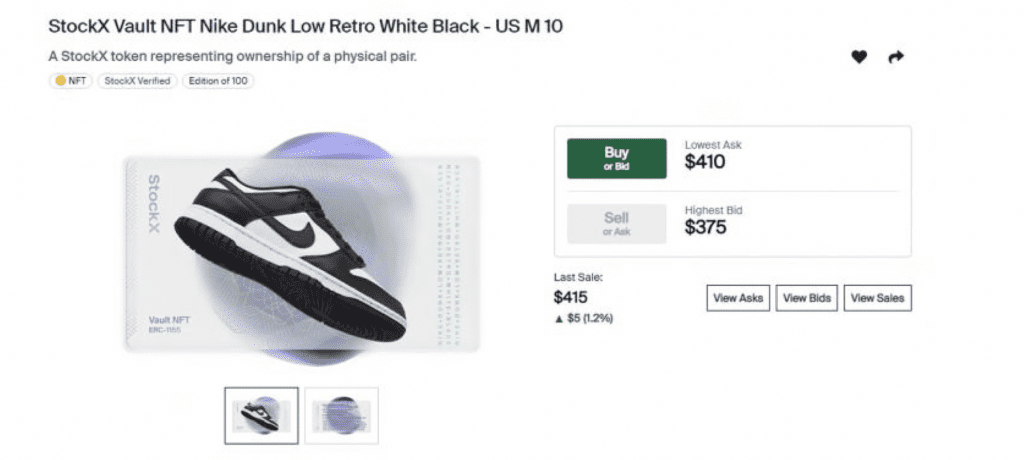StockX is hitting back at the headline-making non-fungible token lawsuit filed against it earlier this year by Nike, arguing that it is not running afoul of the Swoosh’s trademark rights by offering up NFTs “to track ownership of frequently traded physical goods.” In an answer dated March 31, counsel for StockX asserts that the claims made by Nike “lack merit, disregard settled doctrines of trademark law, including the doctrines of first sale and nominative fair use, and show a fundamental misunderstanding of the various functions NFTs can serve.” Speaking to the specific utility of its “Vault NFTs,” StockX states that the tokens “are absolutely not ‘virtual products’ or digital sneakers,” and rather, each of the NFTs is “tied to a specific physical good that has already been authenticated by StockX.” As such, the NFTs, themselves, have “no intrinsic value,” and essentially serve as a “claim ticket, or a ‘key’ to access ownership of the underlying stored item.”
Pushing back against Nike’s trademark claims, including that the Vault NFTs are “unsanctioned products are likely to confuse consumers, create a false association between those products and Nike, and dilute Nike’s famous trademarks,” StockX argues in a preliminary statement in its answer that the likelihood of consumer confusion is low. “At every point in the process,” StockX argues that “consumers are made aware they are purchasing physical goods that StockX has authenticated, that StockX is storing such physical products in its vault, that such physical goods may be traded via blockchain and tracked using a StockX-branded Vault NFT, and that the Vault NFT may be redeemed for the physical goods themselves.” As such, “No one has been – or could be – confused as to the source.”

Beyond that, StockX takes issue with Nike’s position that “resellers of products are legally prohibited from accurately describing the physical products they seek to trade in the digital world,” which it argues is “contrary to trademark law.” Setting the stage for the affirmative defenses that it claims in response to Nike’s causes of action, StockX states that its “use of images of Nike sneakers and descriptions of re-sale Nike products in connection with StockX Vault NFTs is nominative fair use,” or permissible use of another party’s trademark to refer to that party’s products/services.
“It is no different than major e-commerce retailers and marketplaces who use images and descriptions of products to sell physical sneakers and other goods,” which StockX contends “consumers see (and are not confused by) every single day.” And the successful completion of 2,853 Vault NFT transactions since the launch of the offerings in mid-January shows that consumers are not confused by the NFTs, StockX argues, and instead, demonstrates that consumers “recognize that [the] Vault NFTs are cutting-edge technology that revolutionizes the trading of authenticated physical goods.”
In addition to denying the bulk of Nike’s allegations, Detroit-based StockX asserts a number of affirmative defenses, claiming, among other things, that the acts that Nike cites in its complaint “constitute descriptive fair use and/or nominative fair use,” and thereby, should be shielded from trademark liability. Additionally, StockX argues that Nike’s claims are barred by the first sale doctrine, which “permits purchasers of lawfully trademarked goods to display, offer, and sell those goods under their original trademark,” and also barred given that Nike has allegedly “suffered no harm or damages” as a result of StockX’s offering up of the Vault NFTs.
StockX’s answer comes after Nike filed a trademark infringement and dilution, and unfair competition suit in a New York federal court in February, arguing that StockX was “minting” NFTs that make “prominent use [of] Nike’s trademarks, marketing those NFTs using Nike’s goodwill, and selling those NFTs at heavily inflated prices to unsuspecting consumers who believe or are likely to believe that those ‘investible digital assets’ (as StockX calls them) are, in fact, authorized by Nike.”
The case is Nike, Inc. v. StockX LLC, 1:22-cv-00983 (SDNY).














